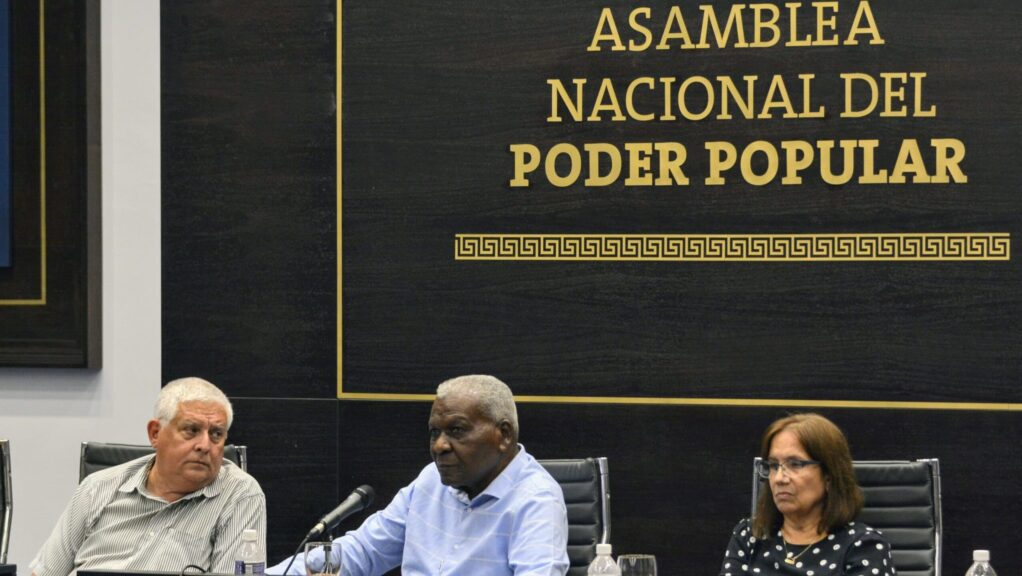
Esteban Lazo led deputies' debate on the Citizenship and Foreigners law
Havana, July 4 (RHC) The president of the National Assembly of Peoples Power Esteban Lazo Hernández, headed the debate and analysis of the draft laws on Citizenship and Foreigners in the National Capitol on Wednesday.
The deputies debated this Wednesday the draft laws on Citizenship and Foreigners, prior to their analysis in the Third Ordinary Period of Sessions of the Parliament, in its X Legislature.
"The Legislative Schedule of the State included the regulation on Citizenship, as a proposal related to the exercise of rights by citizens with high social impact," explained the Chairman of the Parliamentary Committee on Constitutional and Legal Affairs, José Luis Toledo Santander, when presenting the proposal, in a meeting led by the President of the National Assembly of People's Power and the Council of State, Esteban Lazo Hernández.
The President of the Cuban Parliament summed up the broad, deep and democratic debate of the deputies. The deputies presented their proposals for several weeks, by videoconference and in person, which contributed to the improvement of fundamental chapters and of great sensitivity to the people.
Naylin Corrales Sánchez, the deputy elected from the municipality of San Miguel del Padrón in Havana, who is also the district's delegate, highlighted the current relevance of these issues and the responsibility of parliamentarians in enriching the respective legal documents.
The authorities of the Directorate of Identification, Immigration and Foreigners, in charge of the presentation of the legislative proposal, addressed aspects related to effective citizenship; attributions, functions and faculties in charge of the Minister of the Interior and the Civil Registry, as lines of great interest to the population.
"During the drafting and consultation process that led to the current version, the bill was made compatible with the new Criminal, Military and Administrative Procedures Acts, the Procedures Code and the Family Code, as well as incorporating measures that respond to the regulatory needs contained in the country's citizenship legislation," said Colonel Mario Menendez of the Identification, Immigration and Foreigners Directorate during the debate.
He stressed to the deputies from all over the country that the draft Citizenship Law "in its objective of developing the constitutional postulates on citizenship, complements the principle of effective citizenship, that is, Cubans are obliged to use Cuban citizenship for their entry, stay, transit and exit from the national territory.
With the same rigor, the deputies in the National Capitol discussed the draft law on aliens, which consists of VII titles, 16 chapters, 11 sections and 92 articles, 2 transitional provisions, 4 special provisions and 4 final provisions.
For Yoamel Acosta Morales, deputy of the municipality of La Lisa and president of the Municipal Assembly of Popular Power in the area, it is an important step to include in the regulation the experiences of the popular representatives, many of them district delegates, who contribute with their opinions to the collective construction of the projects.
In his speech, Lieutenant Colonel Roilán Hernández Concepción, Head of the Legal Department of the Directorate of Identification, Immigration and Foreigners, emphasized that "the purpose of the proposal is to regulate the attention, protection, identification and legal documentation of foreigners visiting or residing in the country, as well as the process of social integration of the residents, in accordance with the Constitution of the Republic".
The project includes the requirements to be fulfilled by foreigners entering the national territory with a temporary residence visa, in order to obtain this migratory classification prior to the granting of the work permit -he said at the end -; and it also establishes the responsibilities of the bodies, agencies, entities and organizations of associative basis, of professional character and with public purposes, with the foreigners they serve or who are hired for the performance of assigned functions or in the interest of their social purpose. (Source: Parlamentocubano website).

